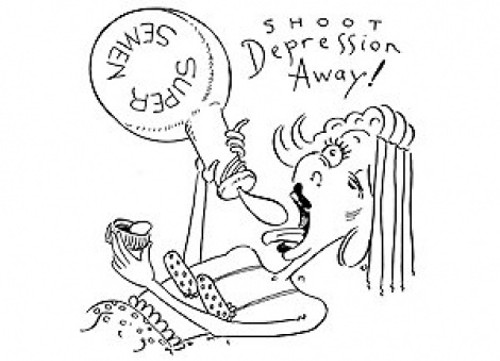Sperm makes a woman happier? What male genius thought that one up? I’ll provide names below. But we need to deal with some preliminary ignorance first.
The substance of interest here is semen, not sperm. Sperm are the minnows; semen is the pond. (Well, the pond plus the minnows.) Whatever miraculous effects may be attributed to a dose of male ejaculate, no one’s claiming they’re due specifically to sperm.
Now to your question. A cherished male belief since antiquity is that the best way to improve an unhappy woman’s attitude is getting her in the sack. Writings attributed to the legendary medical pioneer Hippocrates circa 400 B.C. proposed that hysteria in women was caused by a lack of semen.
Credit for resurrecting this notion in modern times goes to Canadian psychiatrist Philip G. Ney. In a 1986 article, Ney noted the following: 1. hormonelike compounds known as prostaglandins have been shown to improve depressed mood; 2. evening primrose oil, a botanical product, facilitates production of prostaglandins; 3. prostaglandins can also be found in semen; and 4. evening primrose oil seemingly caused one depressed, child-abusing woman to cheer up. A down-in-the-dumps woman who’s read this far may reasonably think: I need to get some evening primrose oil. The author’s more adventurous interpretation: ”Regular amounts of seminal plasma may be important in maintaining a woman’s affective health.” Is that a great pickup line or what?
The scientific community understandably didn’t break any speed records investigating Ney’s neo-Hippocratic hypothesis. However, in 2002, Gordon Gallup and colleagues published a study of 293 college women suggesting semen might indeed be a mood brightener. Their basis for this claim: heterosexually active women who never used condoms scored lower on depression (there’s a test for this—there’s a test for everything) than either A. women who did use condoms or B. women who didn’t have intercourse at all.
Your first reaction may be that unprotected nonmonogamous sex doesn’t seem like a promising road to happiness. Gallup conceded this. Your second may be that there are alternative explanations why a woman using condoms might not be all that cheerful, the most obvious being that condom use suggests a prevalence of one-night stands, which is not everyone’s idea of a great sex life. Gallup’s team discounted this possibility. According to their analysis, women in long-term relationships didn’t seem to be any more or less chipper than women who weren’t. Some other possible factors:
- The always-rubbered got it on only half as often as the never-rubbered. Less sex, more depression, right? Yet Gallup found no relation between mood and sex frequency among cases where condom use was the same.
- Maybe oral contraceptives (used by 70 percent of the no-condom group ) somehow enhance mood. Gallup looked for such effects in his sample and found none.
- Condom users may just tend to be nervous, or otherwise unhappy. A 1983 study (Leary and Dobbins) found socially anxious women were twice as likely to use condoms. OK, that may predate AIDS-era attitudes about condoms, but a 2008 paper (Costa and Brody) saw a positive correlation between women’s condom use and worse mental health overall.
Other studies seem to contradict Gallup’s findings. For example, a recent analysis of nearly 6,000 survey respondents (Mota et al., 2010) found poorer mental health among never-married people (female and male) who never or rarely used condoms. Compared to staunch condom users, they were twice as likely to suffer from mood disorders (including depression) and eight times likelier to have attempted suicide.
Even if we buy the idea that Gallup and company detected a real phenomenon, they themselves concede the ostensible relationship between mood and semen exposure is modest. My assistant Bibliophage, one of those kinky math whizzes who gets off on standard deviations, calculates that antidepressant drugs (specifically Lexapro) appear to have four times the effect.
This brings us to the core issue. We can’t rule out the possibility that semen affects a woman’s mood to an extent. In addition to prostaglandins, seminal fluid contains dozens of signaling factors, including hormones, neurotransmitters and so on.
The question is whether any mood change due to semen is enough to make a difference in humans, considering the wide range of things that contribute to happiness. Let’s suppose you’re a straight woman. Which type of sex partner do you think is going to have a more positive impact on your state of mind: a guy who’s thoughtful, takes his time and uses a condom, or one who climbs aboard bareback, drops his sperm packet, then goes to sleep?
Send questions to Cecil via StraightDope.com or write him c/o Chicago Reader, 11 E. Illinois, Chicago 60611. Subscribe to the Straight Dope podcast at the iTunes Store.
More by Cecil Adams
-
This Is the End, My Friend
This week's Straight Dope marks the last appearance of the column as the Teeming Millions have known it for the past 45 years.
- Jul 11, 2018
-
Do Brain Supplements Do Anything?
Brain Drain
- Jul 4, 2018
-
Is flying really worse for the environment than driving?
Planes and Trains
- Jun 27, 2018
- More »




